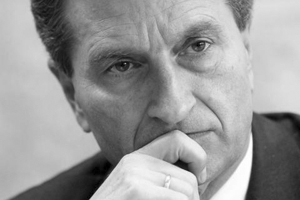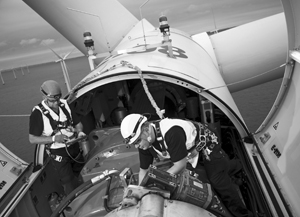"Oettinger's think piece" now needs to be backed up with concrete actions
on
Responses to the 2050 Energy Roadmap:
"Oettinger's think piece" now needs to be backed up with concrete actions
Responses to the EU's 2050 Energy Roadmap range from "broadly" positive to fairly and sometimes highly critical. The most heard criticism is that the Commission fails to put words into action. As WWF puts it, 'Oettinger's roadmap will remain a pure think piece if not backed by effective legislation'.
 |
| WWF warns that 'Oettinger's roadmap will remain a pure think piece if not backed by effective legislation' (photo: Quaker Council for European Affairs) |
The 2050 Energy Roadmap, launched by the European Commission on 15 December, has predictably drawn mixed responses. Despite the radical decarbonisation course charted by the Commission, the “green” lobby groups are generally more critical of the Roadmap than the energy industry.
Industry associations Eurogas (gas industry), Eurelectric (electricity industry) and Europia (oil industry) are all fairly positive in their responses. Eurogas welcomes the ‘clear’ recognition that natural gas ‘will be critical for the transformation of the energy system’ and ‘might play an increasing role in the future’. It also welcomes the ‘prime focus’ given to energy efficiency, ‘where gas equipment has many advantages’.
Eurogas underlines ‘the strong compatibility and partnership between gas and renewable energy’. It does note ‘an inconsistency between the main qualitative and policy messages of the Roadmap in relation to gas and the quantitative energy balances in the various scenarios that are attached’. Put more simply, Eurogas believes ‘the scenarios are rather conservative with respect to the role of gas’.
Europia similarly welcomes ‘the recognition of oil as part of the energy mix in 2050and of the importance of a European presence in domestic refining for the EU economy and for security of supply’. But Europia adds that the Roadmap ‘does not sufficiently acknowledge that keeping this crucial European presence will only be achieved if EU refining is internationally competitive’.
Europia applauds the Roadmap for recognizing that
- there is a ‘trade-off between climate change policies and competitiveness’
- ‘Europe cannot alone achieve global decarbonization’
- ‘Europe needs to strengthen its industrial base’
- energy costs are an important cost factor for industry’ and are already higher than in some other regions
- and ‘safeguards against carbon leakage will have to be kept under close review’.
Eurelectric ‘welcomes the publication of the Roadmap and its ambition to set out a longer-term vision for a decarbonised energy policy’, but is probably the most critical of the three industry associations. It says the Roadmap should ‘make a threefold contribution’. It should:
- pave the way for economy-wide CO2 reduction targets for 2030 and beyond
- establish RD&D as the driver in bringing low-carbon technologies to the market
- and deliver energy policy goals based on cost efficiency
It then adds rather devastatingly that the Roadmap does not elaborate on these three elements, i.e. on ‘how cost-effectiveness, security of supply and competitiveness would be taken into account in a future European energy policy strategy’.
Systems changes
The many lobby groups for renewable energy and climate action all focus on the issue of energy efficiency and the role of renewable energy in their responses. Some of them criticize the Roadmap for not paying enough attention to energy efficiency and renewables. Thus, President Rainer Hinrichs-Rahlwes of the European Renewable Energy Federation comments: ‘The Commission’s Energy Roadmap 2050 regrettably fails to focus on necessary energy system changes towards renewables and efficiency by once more underestimating the potentials of renewable energy sources and by exaggerating their costs.’
ALDE, the Liberal and Democrat Group in the European Parliament, says that the Roadmap ‘sends out a weak message on energy efficiency’. EuroACE, the European Alliance of Companies for Energy
| 'Europe cannot alone achieve global decarbonization' |
Indeed, all five of the Roadmap’s decarbonisation scenarios in fact assume very large absolute reductions in primary energy demand in future – ranging from 32% to 41% in 2050 compared to 2005-2006. If we assume that the EU will also show some economic growth over the next four decades (let’s hope so!), this means that under any scenario the energy intensity of the EU economy will have to come down drastically. The only way this can be done is by drastically improving energy efficiency.
Concrete measures
Most other renewable energy and climate lobby groups, such as EREC (European Renewable Energy Council), the ECF (European Climate Foundation), the EEB (European Environmental Bureau), the Coalition for Energy Savings and Greenpeace – as well as the EBAC (European Building Automation and Controls Association) – do acknowledge that energy efficiency is a ‘key ingredient’ in the Roadmap, as EBAC puts it. However, most of them also believe that the Roadmap does not translate this conclusion into sufficient concrete action.
The Roadmap ‘correctly recognises that renewables and energy efficiency must play a much bigger role in Europe’s energy supply, now and in the long run’, says Arthouros Zervos, President of EREC, but ‘it has failed to merge renewables and efficiency in a joint scenario’. The European Environmental Bureau ‘welcomes the Roadmap’s emphasis on energy savings’ but argues ‘this needs to be followed up with more commitment for action straight away’.
Monique Goyens, Director General of BEUC, the European Consumer Organisation, said that ‘we need concrete measures so that consumers can actually save energy’.
In a very critical statement, WWF warns that ‘Oettinger’s roadmap will remain a pure think piece if not
| 'There are astounding assumptions in all scenarios such as oil prices dropping from over $100 per barrel today to $70 per barrel in 2050' |
Discredit renewables
On the role of renewables in the Roadmap most of the lobby groups express similar reservations. Yes, they are there, and are considered important, but not important enough.
Several groups argue that the Roadmap makes wrong assumptions on future costs. Thus, Zervos of EREC criticises the Roadmap’s impact assessment ‘for claiming that the high renewables scenario would lead to higher electricity prices than the others after 2030. The alleged high price is an attempt to discredit renewables. It is based on completely unrealistic assumptions such as running fossil and nuclear plans very infrequently. In reality no one is going to build a nuclear plant to run at 50% capacity. Other biased assumptions include overly high capital costs for renewables, insufficient energy efficiency, no infrastructure costs for CCS, and an oil price of $70, when it is already over $100 today.’
 |
| 'Despite attempts to prefabricate the results, the scenarios confirm that a renewable energy future comes at no higher energy cost to Europe' (photo: Siemens.com) |
Greenpeace, on the other hand, says that the Roadmap shows ‘that an energy system based largely on renewables and efficiency will cost taxpayers no more than a system locking Europe into fossil fuels and nuclear energy. Renewables emerge as the dominant energy source’, says Greenpeace – and this despite what it describes as ‘skewed calculations to keep nuclear energy and fossil fuels in the energy mix’.
Greenpeace EU energy policy director Frauke Thies says that ‘the Commission will be tempted to overplay the role of coal and nuclear energy to appease the likes of Poland and France, but the numbers in the roadmap are unequivocal. It proves that a modern energy system can’t do without renewables and efficiency, but can easily consign coal and nuclear power to the past.’
Policy gap
Several organisations call upon the Commission to come up with binding renewable energy targets for 2030. At this moment, there are only targets for 2020 and 2050. ‘A binding 2030 target for renewables is the best way to maintain investor confidence and to achieve the emission reduction targets identified in the roadmap and for ensuring sustainable growth for Europe’, says Zervos of EREC.
Anders Eldrup, CEO of Danish energy company Dong, similarly notes that the Roadmap ‘leaves a policy gap between 2020 and 2050. A firm 2030 renewables target and a solid 2030 policy framework are
| 'The Roadmap leaves a policy gap between 2020 and 2050' |
Kjaer of the EWEA sounds a more positive note. He points out that Commissioner Oettinger said at the launch of the Roadmap that he expects binding renewable energy targets for 2030 to be proposed and in place by 2014. ‘The Commission's Communication could have been clearer in its commitment to binding renewable energy targets for 2030. However, with his strong statement today, Energy Commissioner Oettinger has provided European industry and citizens with that clarity’, says Kjaer. ‘The European Parliament and Council must now give the Commission a clear mandate to come forward with ambitious binding 2030 targets for renewable energy.’
|
Breakfast meeting Please note that European Energy Review will organize a breakfast meeting in Brussels on 24 January to discuss the implications of the 2050 Energy Roadmap. We will come with more detailed information about this event early in January. |


Discussion (0 comments)